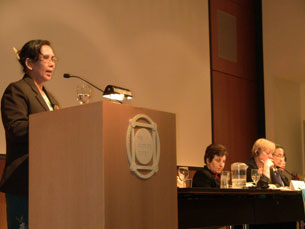Burma: Tribunal calls for Criminal Court
| Publisher | Radio Free Asia |
| Publication Date | 8 March 2010 |
| Cite as | Radio Free Asia, Burma: Tribunal calls for Criminal Court, 8 March 2010, available at: https://www.refworld.org/docid/4bab813117.html [accessed 1 June 2023] |
| Disclaimer | This is not a UNHCR publication. UNHCR is not responsible for, nor does it necessarily endorse, its content. Any views expressed are solely those of the author or publisher and do not necessarily reflect those of UNHCR, the United Nations or its Member States. |
2010-03-08
Burmese abuses prompt a call for international prosecutions.
 A witness testifies at the International Tribunal on Crimes Against Women of Burma, March 2, 2010. May Zaw Khin/RFA
A witness testifies at the International Tribunal on Crimes Against Women of Burma, March 2, 2010. May Zaw Khin/RFA
NEW YORK – A panel of human rights experts and Nobel peace laureates has called on the U.N. Security Council to refer Burma to the International Criminal Court for crimes and violations against women.
The International Tribunal on Crimes Against Women of Burma compiled testimony from 12 women from Burma who reported rape, torture, and other abuses at the hands of the military junta.
The testimony included examples of violence against women, civil and political violations, and social, economic, and cultural violations.
Chang Chang said in a statement that she was 17 when she was practicing songs at a local karaoke shop with friends and a group of soldiers forced them to leave and took them to a military base.
"They came in one by one to rape me. I begged the soldiers not to rape me and I pushed them back to protect myself. But, they forced themselves on me and took off my clothes and they raped me all night," she said.
"It was very dark, so it was hard to know exactly how many soldiers raped us. I remembered seven of them. Seven raped me," she said.
The International Tribunal on Crimes Against Women of Burma was organized here last week by the Nobel Women's Initiative – a group created by six female Nobel Peace Prize Winners – and the Women's League of Burma.
Nobel Peace Laureates Shirin Ebadi and Jody Williams and human rights experts Heisoo Shin and Vitit Muntarbhorn served as judges for the tribunal.
Shirin Ebadi, who won the Nobel Prize for Peace in 2003, said the regime should be held accountable both to the Burmese people and to the rest of the world for its crimes against women.
"We live in a globalized world, which means that Burma cannot do whatever it wants to its people within its own walls," she said.
"Globalization is effective when it helps bring an end to injustice. The international community cannot stand by and let other countries use their sovereignty to commit atrocities against their own people."
Muntarbhorn, a Bangkok-based law professor and U.N. special rapporteur for human rights in North Korea, said the Burmese junta is directly and indirectly complicit in crimes against women.
"On the one hand we have 'state agents ... who commit crimes such as rape and all kinds of other transgressions. On the other hand we have state agents that fail to take action against those who commit crimes," he said.
"What is evident is the state's failure to protect people from violations, including gross violations. And if the state does not protect its people, then who should come in – or what should come in – to help protect its people?"
Action urged
The tribunal urged the Security Council to refer Burma to the International Criminal Court and U.N. member countries to ensure implementation of Security Council resolutions guaranteeing women's participation in post-conflict reconstruction and freedom from sexual violence.
It also demanded that Burma's military regime end all violence against women, stop attacks against ethnic minorities, release all political prisoners, and allow U.N. agencies and NGOs access to the country to monitor assistance to women.
And it called on the junta to ratify human rights treaties and revise the Constitution's amnesty provisions to abide by international laws and norms.
Another woman, Rutha, told the panel in a statement she was forced to serve as a porter at a military camp in Burma where she was raped nightly. She said her father was killed when he refused to allow soldiers to take his 22-year-old daughter.
"The soldiers raped me at night after I portered for them during the day," she said. '
"A soldier came to get me and took me to a room. I told him I was pregnant and begged him not to do any harm, but he did not listen ... I could only cry."
Burma has signed international conventions and treaties but has consistently failed to honor pledges to improve its human rights record or carry out democratic reforms.
The country has long been the focus of global pressure for holding pro-democracy leader Aung San Suu Kyi, also a Nobel peace laureate. Rights groups say there are more than 2,000 political prisoners in Burma, but the country's regime says they are not political.
The Burmese junta has also been accused of persecution of the country's ethnic minorities, sparking a continuing exodus. Some 140,000 refugees live in camps along the Thai-Burma border, according to the U.N. refugee agency.
The full list of recommendations made by the panel to Burma, the Association of Southeast Asian Nations, and the United Nations can be seen at www.nobelwomensinitiative.org
Original reporting by Ingjing Naing for RFA's Burmese service. Additional reporting by Reuters. Written in English by Joshua Lipes. Burmese service director: Nancy Shwe. Executive producer: Susan Lavery. Edited by Sarah Jackson-Han.
Link to original story on RFA website
